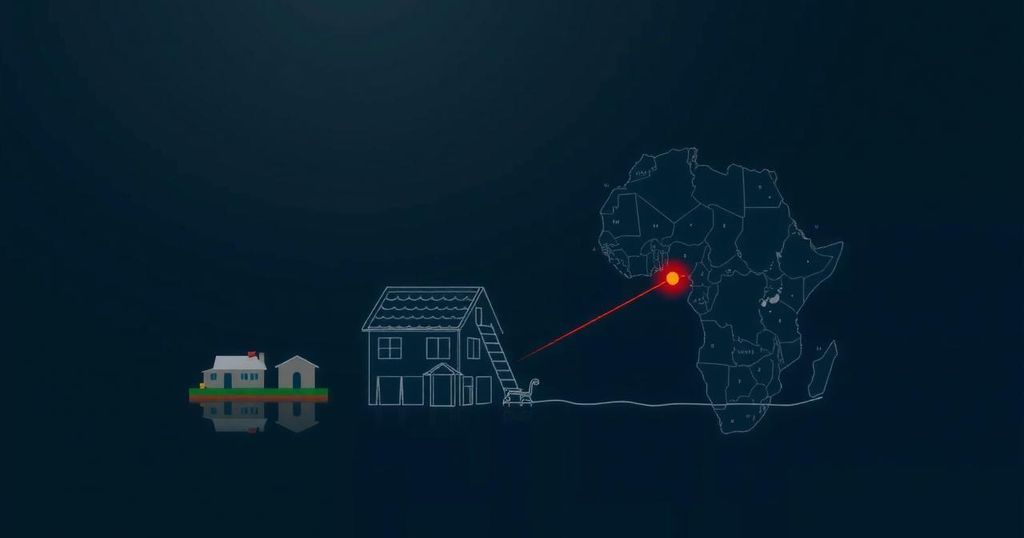Severe Flooding Crisis in Chad, Nigeria, and Cameroon: Millions Affected and Urgent Assistance Required

Severe flooding in Chad, Nigeria, and Cameroon has impacted over 2.7 million people, causing immense destruction and raising concerns over food security. Action Against Hunger reports urgent needs for assistance amid this crisis, seeking funds for emergency responses across affected regions.
Recently, severe flooding has significantly affected millions in Chad, Nigeria, and Cameroon, wreaking havoc on homes and farmlands and raising alarms about the increasing threat of hunger in these regions. In total, over 2.7 million individuals have been impacted, with 1.7 million in Chad, one million in Nigeria, and 236,000 in Cameroon. Action Against Hunger has urgently called for financial assistance to facilitate a rapid emergency response to aid these vulnerable populations. In Chad, the flooding began in late July and has yet to subside, with significant devastation noted across multiple provinces including Lac and Mayo-Kebbi Est. The Sila province, which has been receiving refugees from ongoing conflicts in Sudan, is also experiencing severe effects. The floods have resulted in over 500 fatalities, destroyed more than 210,000 homes, submerged nearly 880,000 acres of farmland, and resulted in the death of approximately 70,000 livestock, exacerbating an already critical food insecurity situation affecting 3.4 million residents. Gustave Gnagny, Country Director for Action Against Hunger in Chad, emphasized the dire situation: “The affected populations are facing critical needs for food, drinking water, shelter, health and protection. According to initial estimates, nearly $100 million is needed to bring relief to these stricken populations. So far, barely 10% of this sum has been mobilized.” In Nigeria, the deluge has predominantly affected the states of Borno, Adamawa, and others, displacing thousands and leaving them without adequate shelter and food supplies. Prior to this crisis, the country was already grappling with severe food insecurity impacting over 32 million individuals. Notably, flooding has submerged half of Maiduguri, the capital of Borno, affecting around 414,000 inhabitants. Thierno Samba Diallo, Country Director in Nigeria, remarked, “The floods have damaged over 300,000 acres of farmland… the damage is likely to exacerbate food insecurity during the current lean season and in the months to come.” In Cameroon, flooding in the Far-North region has rendered approximately 236,000 people vulnerable and led to the destruction of over 30,000 acres of crops. The risk of waterborne diseases is becoming a significant concern as well. Pascal Maillard, Country Director of Action Against Hunger in Cameroon, stressed the urgent need for resources: “Certain infrastructure such as bridges and dykes have already collapsed… the general mobilization of the humanitarian community and donors is vital; the emergency is here.” The increasingly frequent climatic shocks affecting Chad, Nigeria, and Cameroon underline a pressing need for both immediate response to current emergencies and long-term support aimed at helping communities adapt to the ongoing impacts of climate change.
The article discusses the devastating flooding resulting from torrential rains across Chad, Nigeria, and Cameroon, which has led to extensive human suffering, destruction of homes, and agricultural setbacks. With rising food insecurity in a region that is already vulnerable, relief organizations like Action Against Hunger are sounding the alarm for urgent funding and assistance to manage the crisis effectively. The impacts of climate change are becoming apparent, as these countries face an increasing frequency of climatic shocks, calling for significant humanitarian responses both in the short and long term.
The floods in Chad, Nigeria, and Cameroon have created a humanitarian crisis affecting millions, with significant implications for food security and public health. The urgent call for funding and assistance by Action Against Hunger highlights the critical situation at hand, indicating a need for combined immediate relief measures and sustainable long-term support to help these nations recover and adapt to the challenges posed by climate change.
Original Source: www.actionagainsthunger.org






